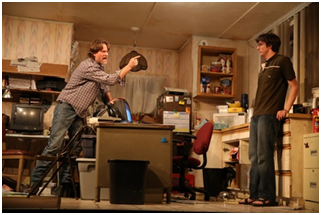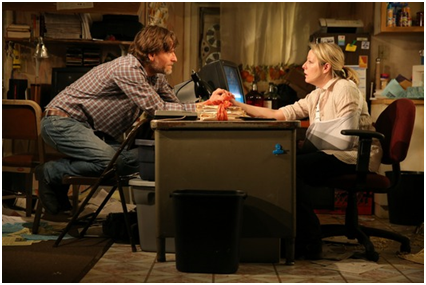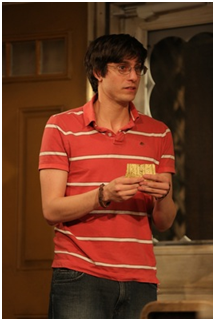The Few
The two-faced nature of these Internet as both ways to escape where you are, but also to escape who you are, is an integral part of the play's psychological landscape.

Michael Laurence and Gideon Glick in a scene from The Few (Photo credit: Joan Marcus)
[avatar user=”Eric Grunin” size=”96″ align=”left” ] Eric Grunin, Critic[/avatar]Samuel D. Hunter’s first New York production, A Bright New Boise (at The Wild Project in 2010), was impressive, and last year’s The Whale (Playwrights Horizons) was tremendous. It’s a great pleasure now to report that his latest play, The Few, shows his powers as a writer continue to increase. While the new play is not as flat-out emotionally overwhelming as The Whale, Hunter builds on his ability to write plausible, generously imagined characters and now expands his palette both emotionally and structurally.
One must assume the playwright didn’t intend these three as any kind of trilogy, but as it happens, these plays are increasingly complex variations on a theme. We’re always in Idaho, always in a confined space: a retailer’s break room, the living room of a tract house, an office in the back of an RV. The protagonist is always a middle-aged man who is haunted by a recent death not his fault, trying to transcend or at the very least escape.
In The Few, the man is Bryan (Michael Laurence). He’s a truck driver, or he used to be. Some years back, maybe around 1990, he got an idea: as a response to the inherent loneliness of the long-distance trucker, he and a couple of friends started a little newspaper, attempting to foster an embryonic sense of community amongst their dispersed brethren. The content was humble, but it was real people telling their real stories, and for a while it seemed to work. Then trouble came: Jim, one of the three partners and Bryan’s best friend, died in a horrible crash out on I-90. Bryan abruptly dropped out of sight, leaving partner QZ (Tasha Lawrence) to hold things together against all odds. And she does hold it together, initially by bringing in a high school kid (Gideon Glick) to run deliveries and manage the computers, and eventually by replacing pretty much all the editorial space in the paper with personals. The phone rings a couple of dozen times every day, with calls from the lovelorn seeking companionship, or at least contact.
Now it’s four years later, fall 1999, Y2K is looming, Bryan shows up at the trailer they use for an office, and our play begins. QZ is mad as hell at Bryan for disappearing on her. Matthew, the new kid, is a bit of an outcast himself, but he’s also Jim’s nephew and grew up to revere the paper’s original ideals (to Bryan’s intense annoyance). As for what Bryan wants, he claims to know, but he has a Hamlet-like reluctance to actually state his goal and go for it, so…maybe not.
Compared to the downward bound heroes of A Bright New Boise and The Whale, Bryan is at least a little optimistic, and a lot easier to take. He’s not yearning for apocalypse, and he’s not eating himself to death. He’s still not a good person, but at least he knows it.

Michael Laurence and Tasha Lawrence in a scene from The Few (Photo credit: Joan Marcus)
Hunter does something very interesting here: while the story unfolds in this little office, we’re made conscious that just outside the door is I-90, gateway to the vast Interstate system, a profoundly lonely space in which many of us spend great swaths of our lives. And yet the ultimate purpose of that web–like the World Wide Web over which you are reading this–is making connections. The two-faced nature of these webs as both ways to escape where you are, but also to escape who you are, is an integral part of the play’s psychological landscape.
There’s yet another web here, the telephone network. A running gag has people leaving personal ads on an answering machine, but it evolves from a mere comedic device into yet another contrapuntal voice in the story.
All the plays mentioned here include strongly-written women, and QZ is the fullest by a large margin. As QZ, Lawrence grabs this and runs, which is not only great to watch but essential to getting the play singing right from the first long beat. Complimentarily, Laurence gives Bryan just the right amount of bone-deep lethargy to keep his character from overbalancing the others.
Gideon Glick as Matthew is terrific, physically disappearing into his character so completely that he would not be recognizable in the street. Actors can get away with playing misfits as a collection of tics, so it’s a great thing to see Glick dig deeper and infuse Matthew’s every movement with his particular personality.

Gideon Glick as Matthew in a scene from The Few (Photo credit: Joan Marcus)
Direction by Davis McCallum is utterly transparent in the best possible way. The set design by Dane Laffrey is packed with interesting and accurate period detail, right down to no-name computers appearing to run Windows 95. (One hopes for the sanity of all involved that those were merely screen caps.) And special props for the extensive props go to property master Andrew Diaz.
One consumer advisory: Rattlestick’s restroom facilities are notoriously inadequate. Some of you will want to arrive early.
But let’s end on a brighter note, and mention that Hunter’s characters often have a fixation on a scrap of language or quotation, which we find endearing.
The Few (extended through June 21, 2014)
Rattlestick Playwrights Theater, 224 Waverly Place, west of Seventh Ave. So., in Manhattan
For tickets, call (866) 811-4111 or visit http://www.OvationTix.com
Running time: 95 minutes with no intermission






Leave a comment